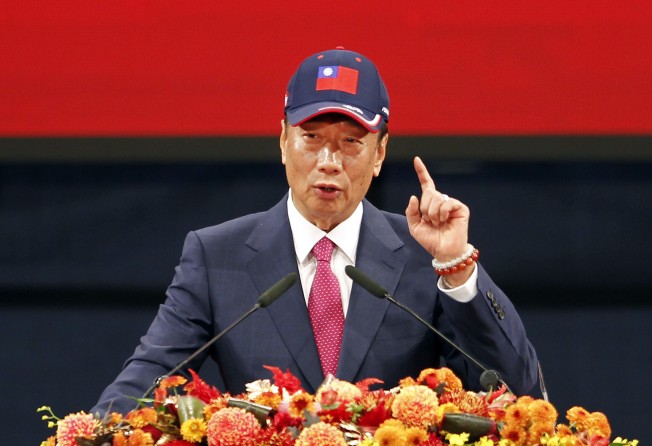Terry Gou accuses Microsoft of ‘scapegoating’ iPhone assembler Hon Hai, bullying Taiwanese companies and taking advantage of US-China trade war
- Microsoft sued Hon Hai for missing royalty payments in California last week
- Gou assured shareholders that the company will ‘almost not suffer’ any loss from the lawsuit

Billionaire Terry Gou Tai-ming accused Microsoft of being a coward and a bully after the US software giant took legal action against his company, electronics contract manufacturer Hon Hai Precision Industry, for allegedly failing to comply with a patent-licensing agreement.
Microsoft on Friday slapped Hon Hai, also known as Foxconn Technology Group, with a lawsuit in California for failing to make royalty payments on time.
The lawsuit claims Taiwan-based Hon Hai, which is Apple’s main assembler of iPhones, was supposed to file regular royalty reports to Microsoft, providing specific information about the manufacturer’s sales of covered products on a per-unit basis. That was designed to make certain per-device royalty payments to Microsoft for the license term.
Gou, the founder and chairman of Hon Hai, held a press briefing on Tuesday in Taipei, where he railed at the Nasdaq-listed Microsoft, which is led by chief executive Satya Nadella. As a contract manufacturer, Hon Hai has never been required to pay royalties for the software, according to Gou.
“I have my sympathies for Microsoft,” he said. “It is resting on its laurels and trying to extend its hegemony from the PC era.”
Hon Hai has become the “scapegoat”, he said, without referring to who he thinks the real target is.
“Microsoft is bullying Taiwanese companies and hoping to take advantage of the US-China trade war negotiations to sue Hon Hai, and make mainland Chinese and American officials include Microsoft in the protected area.”
Gou described Microsoft as a company that would not dare sue “those manufacturers”, without naming those parties. “If they had dared, they won’t be Microsoft, they would be ‘Micro-hard’,” he said. “They are using us to indirectly warn others.”
Microsoft said the company “takes its own contractual commitments seriously and we expect other companies to do the same,” according to an emailed statement.
At the press briefing, Gou assured Hon Hai shareholders that the company “will almost not suffer any loss” as a result of Microsoft’s lawsuit.
On Tuesday morning before that briefing, Gou posted on Facebook the reason Microsoft would not earn patent royalties from manufacturers that used its software. “If Microsoft sued Chinese vendors, its products will be rejected by young Chinese users … Then it turns to attack a Taiwanese company,” he wrote.
Microsoft, however, said in its emailed statement that legal action was taken “to exercise the reporting and audit terms of a contract we signed in 2013 with Hon Hai”.
“Our working relationship with Hon Hai is important and we are working to resolve our disagreement,” the US company said.
This was not the first time Hon Hai has been involved in a patent lawsuit. In 2017, US mobile chip technology supplier Qualcomm sued unsuccessfully to force contract manufacturers, including Hon Hai, to pay royalties on the patents used on iPhones.
Unlike his reaction to the Microsoft lawsuit, Gou kept a low profile throughout that case involving his company’s biggest customer, Apple.